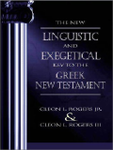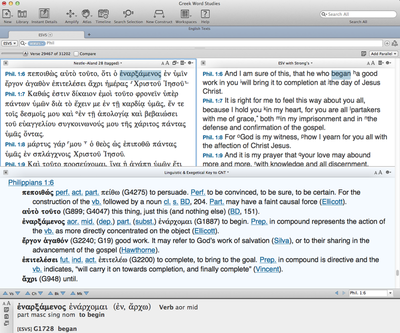 If you are interested in studying the Greek New Testament, but don’t quite consider yourself a Greek scholar, you may want to pick up The New Linguistic and Exegetical Key to the Greek New Testament (AKA “GNT Key” in Accordance) that was just released. This useful companion to the Greek New Testament is designed for students and pastors whose knowledge of Greek grammar is limited but who want to study the Greek New Testament. This resource is notable for the way it gathers, and filters through, the sea of information available in modern lexicons, grammars, journals, and commentaries. For example, a given verse entry might supply lexical information pulled from BDAG, grammatical information drawn from Wallace’s Greek Grammar Beyond the Basics, and exegetical notes cherry-picked from the Word Biblical Commentary. Most of these insights are condensed into a single phrase or sentence, resulting in a set of 3-10 relevant notes for any given verse.
If you are interested in studying the Greek New Testament, but don’t quite consider yourself a Greek scholar, you may want to pick up The New Linguistic and Exegetical Key to the Greek New Testament (AKA “GNT Key” in Accordance) that was just released. This useful companion to the Greek New Testament is designed for students and pastors whose knowledge of Greek grammar is limited but who want to study the Greek New Testament. This resource is notable for the way it gathers, and filters through, the sea of information available in modern lexicons, grammars, journals, and commentaries. For example, a given verse entry might supply lexical information pulled from BDAG, grammatical information drawn from Wallace’s Greek Grammar Beyond the Basics, and exegetical notes cherry-picked from the Word Biblical Commentary. Most of these insights are condensed into a single phrase or sentence, resulting in a set of 3-10 relevant notes for any given verse.
I am relatively new to this resource, but since I am preparing to lead a study in Philippians for my small group Bible study, I thought I would try using the GNT Key as I studied the opening verses of Philippians 1. Here are some of the useful insights the GNT Key provided along the way.
- Philippians 1:3 ἐπί may have a causal meaning, “I thank my God because of your every remembrance of me” (Word Biblical Commentary).
- Philippians 1:7 φρονεῖν pres. act. inf. φρονέω (G5858) to be minded, to think, to be concerned for, to feel. The word denotes a general disposition of mind including both feeling and thought, emotions and mind (ICC and Word Biblical Commentary).
- Philippians 1:8 σπλάγχνον (G5073) the inward parts; i.e., the heart, liver, lungs which were collectively regarded as the seat of feeling. The strongest word in Gr. for the feeling of compassion (Vincent; MNTW, 156f; TDNT; NIDNTT; TLNT; EDNT).
- Philippians 1:9 ἐπιγνώσις (G2106) knowledge, recognition. Prep. in compound indicates a knowledge directed toward an object. Here the word indicates a firm conception of those spiritual principles which would guide them in their relations w. one another and the world (Expositor’s Greek Testament Commentary).
I found some of these notes quite intriguing. In particular, Philippians 1:3 has always been one of my favorite verses, and the thought of ἐπί being used as a causal preposition was certainly interesting. It essentially swaps the rememberer with the rememberee.
In reflecting on today’s study session with the GNT Key, I have a few thoughts that I wanted to pass on. First, the GNT Key seems like a good option for those who want to move beyond their English translation and toward reading the New Testament in Greek. For reference, I typically study the Bible primarily in English and keep the NA28 up in a parallel pane for reference. I use cross-highlighting and Instant Details for basic information, and I triple-click on any Greek words I want to learn more about. However, the GNT Key allowed me to take a fundamentally different approach, instead studying primarily out of the NA28 while consulting the GNT Key when I got stuck. I did keep up a parallel pane with the ESVS as a last resort, but rarely needed it thanks to the insights in the GNT Key, and a little parsing help from Instant Details.
My GNT Key Workspace
Another thing I like about the GNT Key is the way it clarifies when multiple Greek words are being used together to form a phrase or when one word impacts the translation of another word. Since I only took first-year Greek in seminary, I am mostly familiar with individual words and their definitions. However, there are many times in the Greek New Testament where multiple words are being used together in an expression, and these expressions are often lost on me. However, the GNT Key seems to clarifiy the relationship between words in many cases, which is very helpful for someone like me who doesn’t have any advanced Greek training. This information feels like it will be really helpful to anyone who wants to move beyond their English translation and start reading primarily from the Greek New Testament.
Lastly, I just really like the core concept of pulling together droves of information from many sources and whittling it down to just a few relevant nuggets of insight. Anyone who has a large theological library knows that it is a bit of a double-edged sword. On the one hand, it’s great to feel like you have endless resources to draw insight from. On the other hand, it can feel a bit overwhelming to sort through it all. Sometimes I can spend my entire study session consulting multiple commentaries on a single verse or two, which is great fun when I have the time, but I often don’t. The GNT Key offered useful insights where I needed them without bogging me down in paragraphs of information.
So, if you’re interested in studying the Greek New Testament, but you lack advanced Greek skills, I’d highly recommend The New Linguistic and Exegetical Key to the Greek New Testament. It seems to be a great choice for those who are ready to move beyond the occasional Greek word study and onto actually reading chapters of the New Testament in the NA28 or GNT-T. You can always keep your English Bible translation up in a parallel pane if you need it, but if your experience was anything like mine, you may not. Click on the Learn More button below to check out the product page for details.



